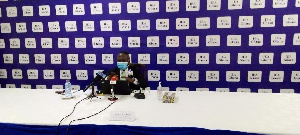 Dr John K. Kwakye, Director of Research at IEA
Dr John K. Kwakye, Director of Research at IEA
The Institute of Economic Affairs (IEA) has asked the government to consider reviewing the country’s annual average growth to a notch higher to deliver faster growth and enhance the economic wellbeing of citizens.
The government in its 2021 budget pegged the country’s medium-term annual average growth (2021-2024) at five per cent.
Dr John K. Kwakye, Director of Research at IEA, speaking on the 2021 Mid-Year Budget Review, said the government must take a second look at the growth estimates if it wanted to achieve quick growth and improve the living standard of the people.
He said the five per cent annual growth target was woefully inadequate to spur the needed development the country so dearly desired.
He, therefore, urged the government to leverage the many untapped natural and human resources as well as excess production capacities to speed up growth.
“The budget review does not contain medium-term growth projections as the 2021 budget itself did,” he said. “The Minister maintained the Gross Domestic Product (GDP) growth of 5.0 projected for 2021 in the November budget. While this is relatively high, it must be seen as coming from a low GDP base in 2020.”
“We are more concerned about the medium-term growth estimates, which average five per cent. We maintain that as a developing country with abundant untapped natural and human resources and excess production capacities, we should be able to leverage these resources and capacities so that we can grow faster and deliver our people out of poverty more quickly,” Dr Kwakye said.
On revenue mobilization, the Director of Research advocated the widening of the country’s tax net and plugging of all revenue loopholes to enable the country to maximize revenue collection.
Ghana loses in excess GHC5 billion annually through tax exemptions alone.
Dr Kwakye also noted that while the country generated little as revenue, the government’s allocation of this revenue was poor and inefficient, saying little was spent on capital expenditure.
Ghana’s total expenditure, in 2021, is estimated at GHC114billion and this Dr Kwakye noted was insufficient considering the plethora of projects and initiatives the government had to undertake.
“In fact, in GDP terms, the 2021 expenditure is 25 per cent, which is much less than the middle-income countries’ average of about 35 per cent.
The problem is that our expenditure is constrained by our equally low revenue effort since the budget deficit has to be contained somewhat,” he said.
“A major problem with our relatively small expenditure is that it is grossly skewed in favour of recurrent expenditure and at the expense of capital expenditure (CAPEX),” he added.
Ghana’s recurrent expenditure for 2021 is estimated at GHc109.9 billion, which is 20 per cent of GDP, while CAPEX is about GHc17.6 billion or four per cent of GDP.
Dr Kwakye advised the government to invest more in capital expenditure to spur rapid economic growth.
“As a developing country, we should be allocating 10-15 per cent of our national income (GDP) to CAPEX because that is what will allow the economy to grow rapidly and move the country up the development ladder quickly enough,” Dr Kwakye explained.